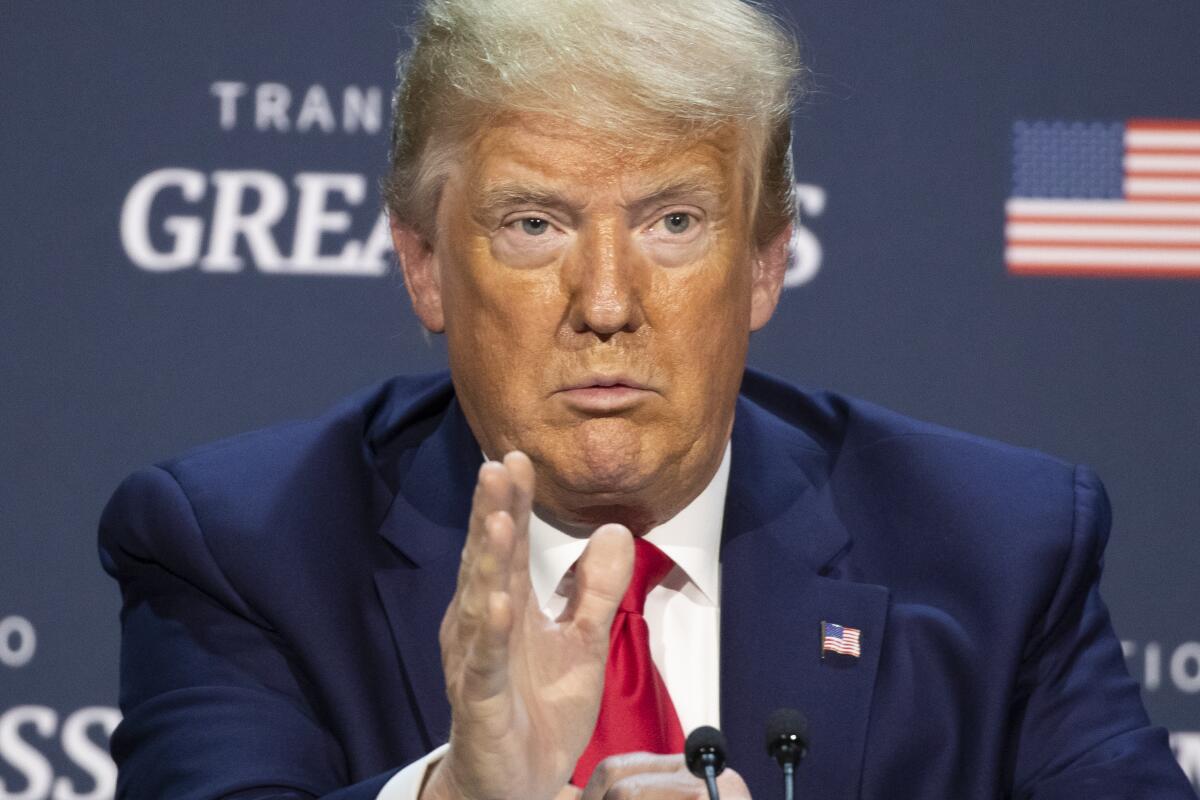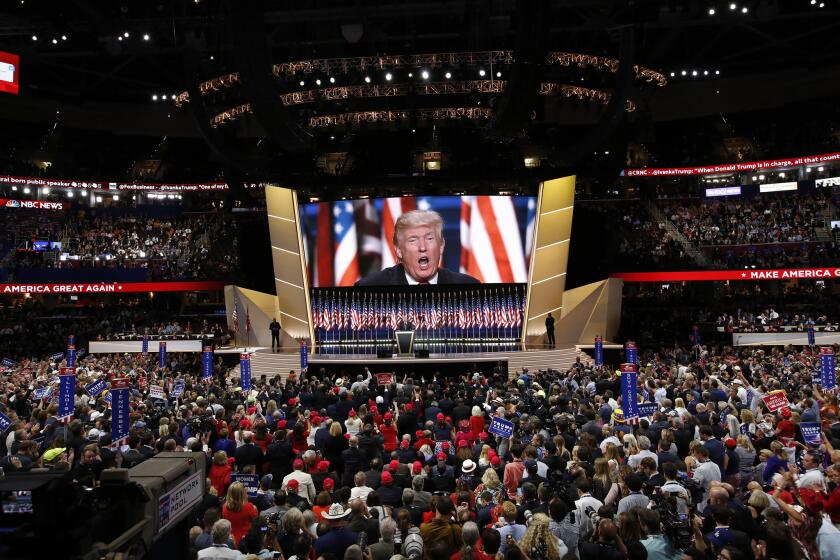Why doesn’t the GOP need a 2020 platform? Because Trump is the GOP now

- Share via
On Wednesday, the Republican National Committee spelled out the details for its August nominating convention, which, at President Trump’s insistence, will be held in-person. Most of the convention, including the president’s acceptance speech, will now be held in Jacksonville, Fla., because Trump found the coronavirus regulations in Charlotte, N.C., the original venue, too restrictive.
One of the most important reported changes to the convention is the GOP’s decision to dispense with the platform committee and simply reuse the 2016 platform for 2020.
Voters almost never read platforms. But they matter because they are vitally important to political parties.
The process of drafting a platform is usually an arduous exercise in coalition maintenance. Hundreds of groups will typically appear before the platform committee asking for statements supporting their cause, on everything from the home mortgage interest tax deduction to handgun access to abortion laws.
Not every request is granted. Sometimes requests conflict with each other, and delegates have to weigh competing interests. How those conflicts are resolved signals which groups are ascendant in the party and which aren’t. Platforms can also help us see which issues the party considers critical to its electoral success at any given moment, and they can be a good indicator of how party members will behave in office.
Party platforms, for instance, have been studied to see how the two major parties prioritized and positioned themselves on women’s rights in the second half of the 20th century. They can show how political rhetoric shifts or remains constant over time. The fact that the Trump campaign successfully lobbied to weaken the party’s 2016 platform on providing military aid to Ukraine in its struggle with Russia turned out to be important to understanding how the administration would govern.
The GOP has opted to reuse its 2016 official party platform. Here’s what both parties were saying in 2016.
Platforms are also a chance for parties to signal a shift in ideological direction, particularly if they’re worried about winning the next election. The GOP lost the popular vote in 2016 and only won the White House by a hair, and Trump is in real trouble in the polls right now. If there’s a time to rethink some platform planks to avoid the appearance of extremism, it might be now.
All of this makes it astounding that the GOP is giving up on writing a new platform that could speak to this moment or even elaborate on Trump’s goals for a second term.
The political world of 2020 is not what it was four years ago. Barack Obama is not the incumbent, despite what the platform would have us believe (it castigates the “current president”). Also, issues have changed. A new platform would have allowed Republican leaders to address new issues that have arisen — a global pandemic, a deep recession, an increasingly powerful and popular Black Lives Matter movement, proper government responses to protests, changes in China’s role in the world, the impeachment that happened just a few months ago, healthcare, Russian interference in elections, among other crises.
Some party leaders might want to avoid talking about these problems publicly, but others, even members of a very stalwart GOP base, feel that having a stale platform is simply tone deaf.
In four years, the Republican Party has shifted in its priorities. The 2016 platform calls for a constitutional amendment to prohibit same-sex marriages, an issue that has dropped in priority for the GOP and could prove more of a political embarrassment this year. The old platform also included coded support for gay conversion therapy. Republican candidates may find the need to distance themselves from their own platform this year.
In fairness, keeping an outdated platform in place may be better than Jared Kushner’s earlier idea of paring down the 58-page platform into a one-page mission statement, a move reflecting a prioritization of marketing over policy or any kind of governing philosophy.
It’s remarkable enough that the Republican National Committee is willing to accede to Trump’s demands for an in-person convention despite the clear risk of coronavirus transmission. He wanted the spectacle of a large, adoring audience, which he seems to think will make him look strong compared with the Democrats, who seem likely to hold an online convention. But the platform decision may be the first time in the modern era that a major political party has decided not to bother to create a new platform.
This is, however, not the first time a major party has announced its nominee basically is its platform. In 1912, for example, the Democrats had a difficult time describing what their party stood for. When confronted with that question, a New Jersey political leader of the time said, “A platform was hardly necessary, for the candidate is a platform in himself. If anyone asks you what the Democratic platform is, just tell him, ‘Wilson.’”
This is the message that Republicans are communicating today. Four years ago, they picked a nominee who disagreed with them on a number of key issues like Social Security, military deployments, the Iraq war and health reform, and decided that was OK as long as he could win. (He later came to adopt their views on most issues.)
Now, given a chance to state their political beliefs, they’re saying that Trump is the one thing they believe in and that he is the party.
Seth Masket is a professor of political science and director of the Center on American Politics at the University of Denver.
More to Read
A cure for the common opinion
Get thought-provoking perspectives with our weekly newsletter.
You may occasionally receive promotional content from the Los Angeles Times.










